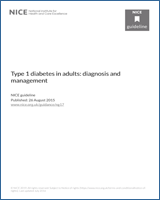NCBI Bookshelf. A service of the National Library of Medicine, National Institutes of Health.
This publication is provided for historical reference only and the information may be out of date.
Type 1 diabetes can, if poorly controlled, produce devastating problems in both the short and the long term. Good control of blood glucose levels reduces the risk of these problems arising, but can be very difficult for patients and carers to achieve. This guideline emphasises that the NHS should provide all patients with the means – and the necessary understanding – to control their diabetes, and that it should help patients integrate the disease management with their other activities and goals. It argues that every person with diabetes should be able to develop their own care plan and utilise effective treatment in a way agreeable to them. The input of various health professionals may be needed to achieve this, and should be readily available. A system of regular monitoring, so that any complications which do develop are picked up at an early stage and treated appropriately, should also be provided.
In common with all NICE guideline recommendations, those for Type 1 diabetes have been developed using a rigorous, evidence-based methodology. An extensive search identified the relevant medical literature, and papers were carefully assessed to ensure that recommendations were based on treatment and practice of proven benefit. This process was carried out by a guideline development group (GDG), a small team from the NCC-CC working together with patients and health professionals with wide expertise in Type 1 diabetes. They have used the available evidence to produce guidance that is clinically relevant as well as methodologically sound. The availability of clinical expertise also allowed recommendations to be made in areas for which there is inadequate evidence, but which are important to patients and carers. At the same time the need for further research in these areas was indentified.
Contents
- Acknowledgements
- Membership of development groups
- Preface
- Glossary
- The development of the guideline
- The guideline
- 4. Diagnosis
- 5. Care process and support
- 6. Education progammes and self-care
- 7. Blood glucose control and insulin therapy
- 8. Arterial risk control
- 9. Management of late complications: diabetic eye disease
- 10. Management of late complications: diabetic kidney disease
- 11. Management of late complications: diabetes foot problems
- 12. Management of late complications: diabetes nerve damage
- 13. Management of special situations
- 14. Areas for future research
- Appendices
- References
- Type 1 Diabetes in AdultsType 1 Diabetes in Adults
Your browsing activity is empty.
Activity recording is turned off.
See more...

